Artificial intelligence is revolutionizing industries across America, creating unprecedented demand for AI skills. With AI engineer salaries averaging $247,000 annually and companies investing billions in AI infrastructure, there’s never been a better time to develop expertise in this field. Whether you’re a complete beginner or looking to advance your existing skills, online courses offer flexible, accessible pathways to mastering AI technologies that are shaping our future.
We’ve researched and compiled the most popular AI courses Americans are enrolling in this year, covering everything from basic concepts to advanced applications like large language models and computer vision. This guide will help you navigate the best AI courses USA 2025 has to offer, with options for every skill level and budget.
Quick Overview: Top AI Courses in 2025
| Course Name | Platform | Level | Price | Certificate | Best For |
| AI For Everyone | Coursera (DeepLearning.ai) | Beginner | Free (audit) / $49 for certificate | Yes | Non-technical introduction |
| AI Fundamentals | IBM SkillsBuild | Beginner | Free | Yes | Foundational knowledge |
| Computer Science for AI | Harvard (edX) | Intermediate | Free (audit) / $348 for certificate | Yes | CS fundamentals for AI |
| Deep Learning Specialization | Coursera (DeepLearning.ai) | Intermediate | Free (audit) / $49/month for certificate | Yes | Neural networks & deep learning |
| LangChain for LLM Applications | Udemy | Intermediate | $89.99 | Yes | Building LLM applications |
| Stanford NLP with Deep Learning | Stanford Online | Advanced | Free | No | NLP specialization |
AI Education Trends in 2025
The AI education landscape is evolving rapidly in 2025, with several key trends shaping how Americans are learning these in-demand skills:
- Large Language Model Specialization – Courses focusing specifically on understanding and implementing LLMs like GPT-4 and Claude are seeing massive enrollment increases
- Practical Application Focus – More courses now emphasize hands-on projects that solve real-world problems rather than just theory
- AI Ethics Integration – Responsible AI practices are no longer separate courses but integrated into core curriculum
- Industry-Specific AI Training – Specialized courses for healthcare, finance, and manufacturing sectors are growing in popularity
- Micro-Credentials – Shorter, focused learning paths that build specific AI skills are replacing some longer programs
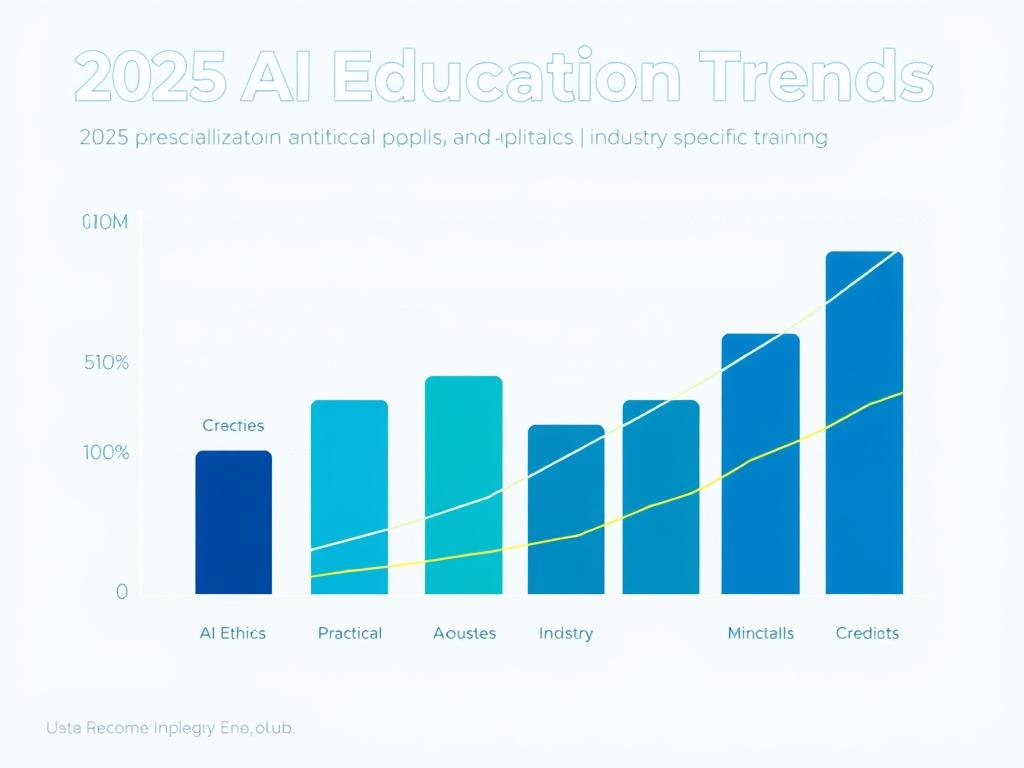
Best AI Courses for Beginners in 2025
If you’re new to artificial intelligence, these courses provide excellent entry points without requiring extensive technical background. They’ll help you understand core AI concepts and prepare you for more advanced learning.
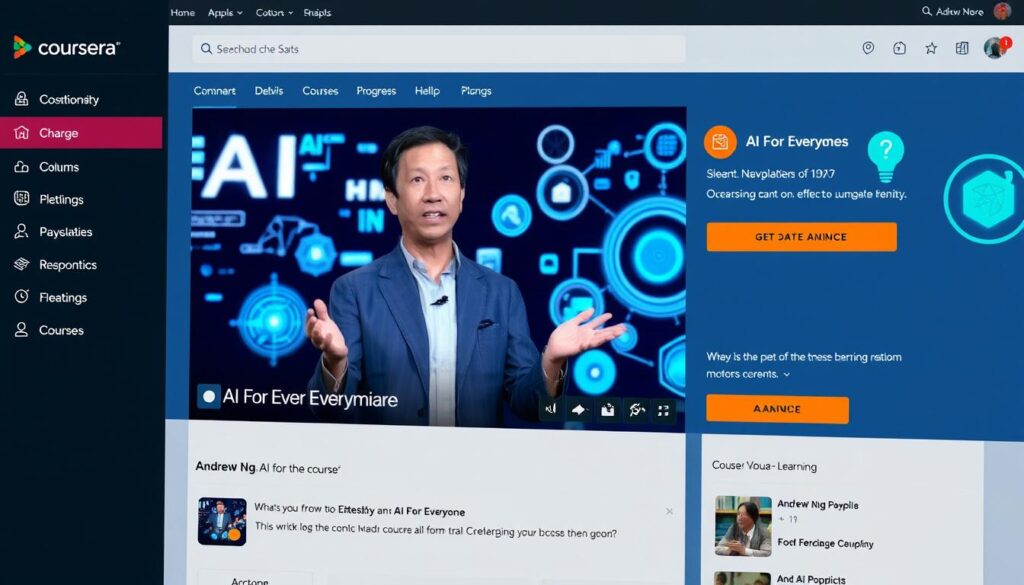
1. AI For Everyone by Andrew Ng (Coursera)
Created by AI pioneer Andrew Ng, this non-technical course is perfect for absolute beginners wanting to understand what AI can and cannot do. You’ll learn AI terminology, how to spot opportunities for implementing AI in business, and gain the knowledge needed to participate in AI-related discussions.
Pros
- No coding or math prerequisites
- Taught by a world-renowned AI expert
- Short (4 weeks) and accessible format
- Excellent for business professionals
Cons
- No hands-on technical skills
- May be too basic for those with some AI knowledge
- Limited practical applications
Key Topics: AI basics, machine learning concepts, building AI projects, AI transformation playbook, AI ethics and societal impact
Duration: 4 weeks (3-4 hours/week)
Price: Free to audit, $49 for certificate
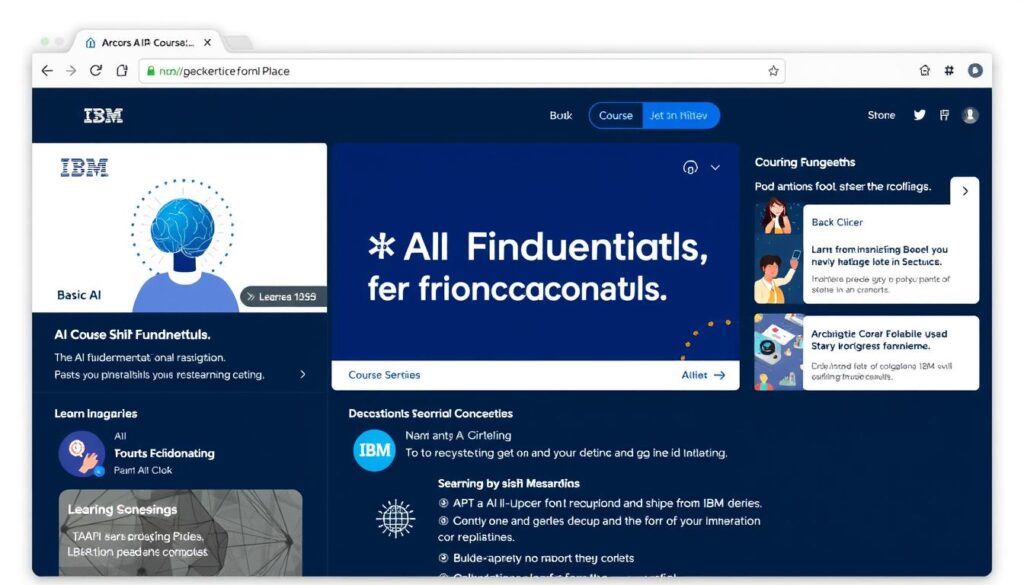
2. AI Fundamentals by IBM SkillsBuild
IBM’s free AI Fundamentals course provides a comprehensive introduction to artificial intelligence concepts and applications. The program consists of six courses covering everything from basic AI principles to ethics, making it ideal for beginners wanting a well-rounded foundation.
Pros
- Completely free with certificate
- Comprehensive coverage of AI basics
- Strong focus on AI ethics
- IBM-recognized credential
Cons
- Less interactive than some alternatives
- IBM-specific examples and tools
- Limited community support
Key Topics: AI fundamentals, machine learning basics, AI applications, AI ethics, Watson AI services
Duration: 10 hours total
Price: Free
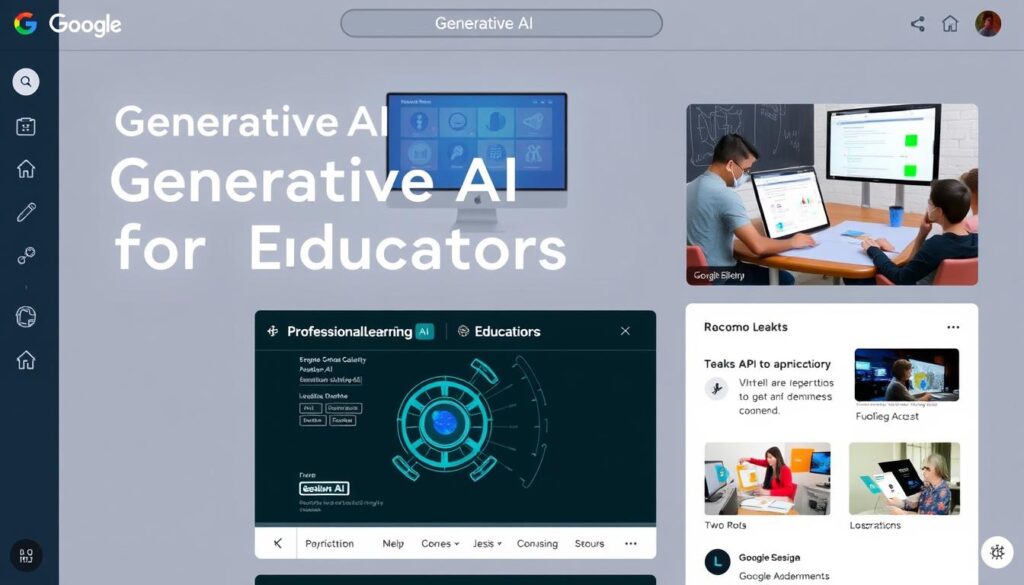
3. Generative AI for Educators by Google
Developed in collaboration with MIT, this course is specifically designed for educators but valuable for anyone wanting to understand how generative AI can be applied in teaching and learning contexts. It addresses both the opportunities and challenges of AI in education.
Pros
- Free with professional development certificate
- Practical focus on real-world applications
- Addresses AI ethics and responsible use
- Developed by Google and MIT experts
Cons
- Education-specific focus may limit some users
- Relatively short (2 hours) compared to other courses
- Limited technical depth
Key Topics: Generative AI basics, classroom applications, ethical considerations, preventing AI misuse, designing AI-enhanced lessons
Duration: 2 hours
Price: Free
Best Intermediate AI Courses in 2025
For those with some programming experience or basic AI knowledge, these intermediate courses will help you develop practical skills in building and implementing AI systems.
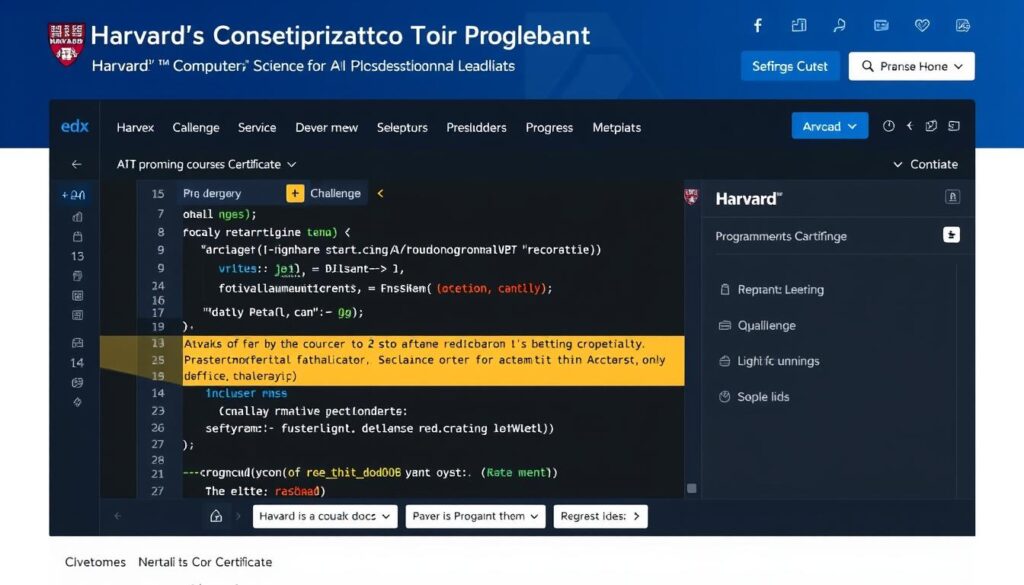
4. Computer Science for Artificial Intelligence Professional Certificate by Harvard
This five-month professional certificate from Harvard provides a solid computer science foundation specifically tailored for AI applications. The program includes Harvard’s popular CS50 course followed by an AI-specific curriculum with challenging problem sets and projects.
Pros
- Prestigious Harvard credential
- Comprehensive CS fundamentals for AI
- Challenging, high-quality projects
- Active learning community
Cons
- Relatively expensive for certificate
- Demanding time commitment
- Steep learning curve for true beginners
Key Topics: Programming fundamentals, data structures, algorithms, neural networks, search techniques, knowledge representation, natural language processing
Duration: 5 months (8-10 hours/week)
Price: Free to audit, $348 for certificate
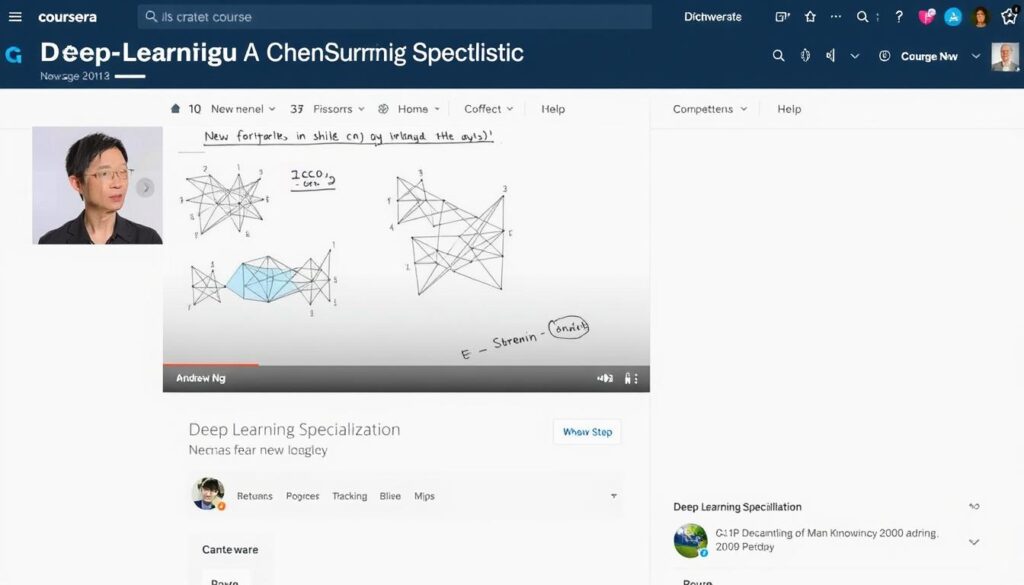
5. Deep Learning Specialization by DeepLearning.ai
This comprehensive specialization by Andrew Ng is the gold standard for deep learning education. Through five courses, you’ll master neural networks, deep learning techniques, and their applications in computer vision and natural language processing.
Pros
- Industry-recognized credential
- Taught by leading AI researcher
- Balanced theory and practical implementation
- Comprehensive coverage of deep learning
Cons
- Requires math background (calculus, linear algebra)
- Some programming assignments can be challenging
- Monthly subscription model can get expensive
Key Topics: Neural networks, deep learning, hyperparameter tuning, convolutional networks, sequence models, NLP, transformers
Duration: 5 months (5-10 hours/week)
Price: Free to audit, $49/month for certificate
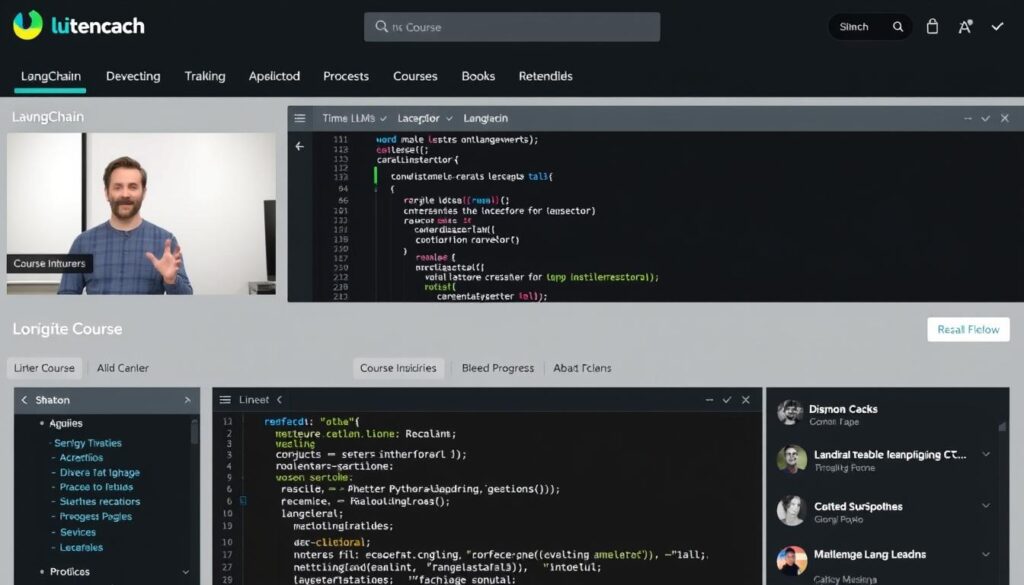
6. LangChain – Develop LLM powered applications with LangChain
This highly practical Udemy course teaches you how to build applications powered by large language models using the popular LangChain framework. You’ll learn to create chatbots, document analyzers, and other AI tools that leverage the latest LLM technologies.
Pros
- Highly practical with real-world projects
- Focuses on cutting-edge LLM applications
- Taught by Google Cloud LLM specialist
- Excellent production quality
Cons
- Requires Python programming experience
- Technology evolves quickly (may need updates)
- No free audit option
Key Topics: LangChain fundamentals, ReAct agents, retrieval augmented generation (RAG), vector databases, prompt engineering, building AI assistants
Duration: 15.5 hours
Price: $89.99 (often discounted)
Best Advanced AI Courses in 2025
These advanced courses are designed for professionals with strong programming skills and AI fundamentals who want to specialize in cutting-edge areas or develop expertise in specific AI domains.
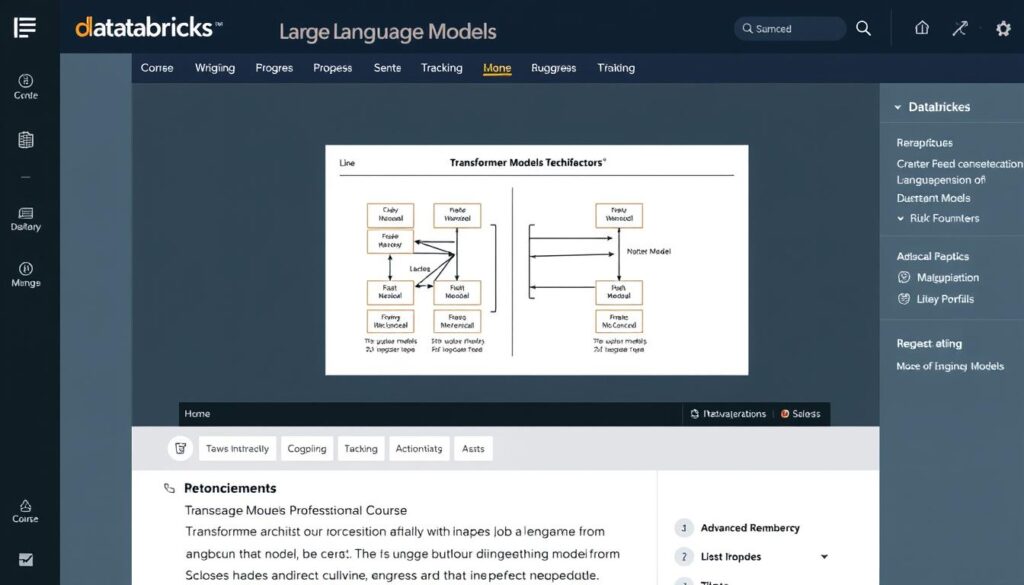
7. Large Language Models Professional Certificate by Databricks
This specialized certificate program focuses exclusively on large language models, the technology behind ChatGPT and other generative AI systems. You’ll learn how LLMs work, their applications, and advanced techniques for fine-tuning and deployment.
Pros
- Cutting-edge content on LLMs
- Taught by Databricks experts
- Includes both theory and implementation
- Covers recent advancements like RLHF
Cons
- Requires machine learning experience
- Advanced mathematics needed
- Relatively expensive for certificate
Key Topics: Transformer architecture, embeddings and vector search, multi-stage reasoning, fine-tuning LLMs, LLMOps, efficient deployment
Duration: 3 weeks (5-10 hours/week)
Price: Free to audit, $198 for certificate
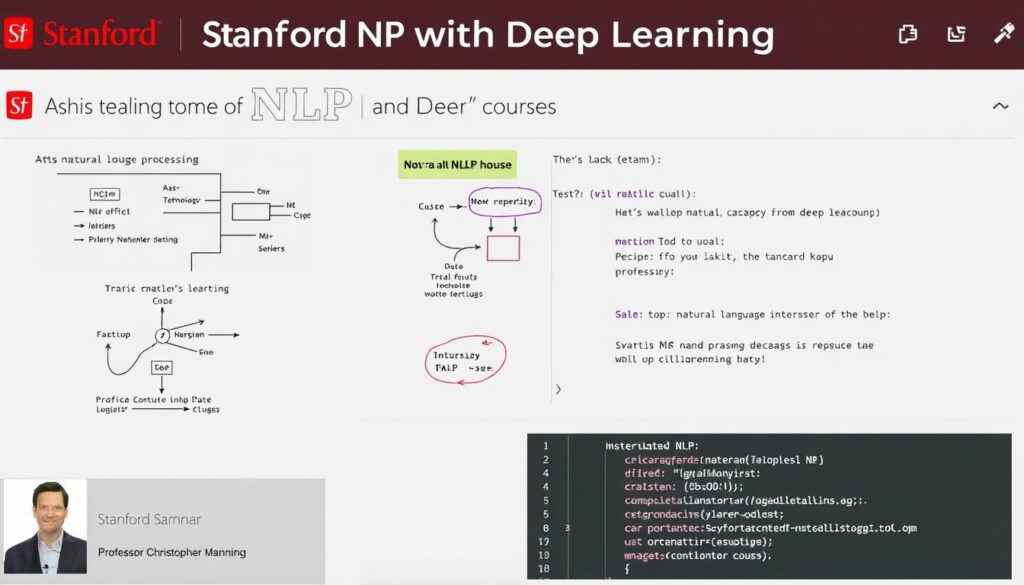
8. CS224N: Natural Language Processing with Deep Learning by Stanford
This advanced course from Stanford University provides a deep dive into natural language processing using deep learning techniques. Taught by Professor Christopher Manning, a pioneer in NLP, the course covers everything from word vectors to transformers and is available for free online.
Pros
- World-class Stanford instruction
- Comprehensive coverage of NLP
- Completely free access
- Cutting-edge research insights
Cons
- Very advanced mathematics required
- No certificate or graded assignments
- Self-directed learning (no support)
Key Topics: Word vectors, neural networks, backpropagation, dependency parsing, recurrent networks, transformers, BERT, GPT models
Duration: 10 weeks (self-paced)
Price: Free

9. Self-Driving Cars with Duckietown by ETH Zurich
This unique course combines online learning with a physical robotics kit to teach advanced AI concepts for autonomous vehicles. You’ll program a small robot called Duckiebot to navigate roads, recognize signs, and avoid obstacles using computer vision and reinforcement learning.
Pros
Cons
- Expensive due to hardware requirements
- Advanced prerequisites (Python, Linux, math)
- Time-intensive setup and projects
Key Topics: Robotics fundamentals, computer vision, control systems, reinforcement learning, path planning, object detection
Duration: Self-paced
Price: Free course, $399 for materials
Free vs. Paid AI Courses: Making the Right Choice
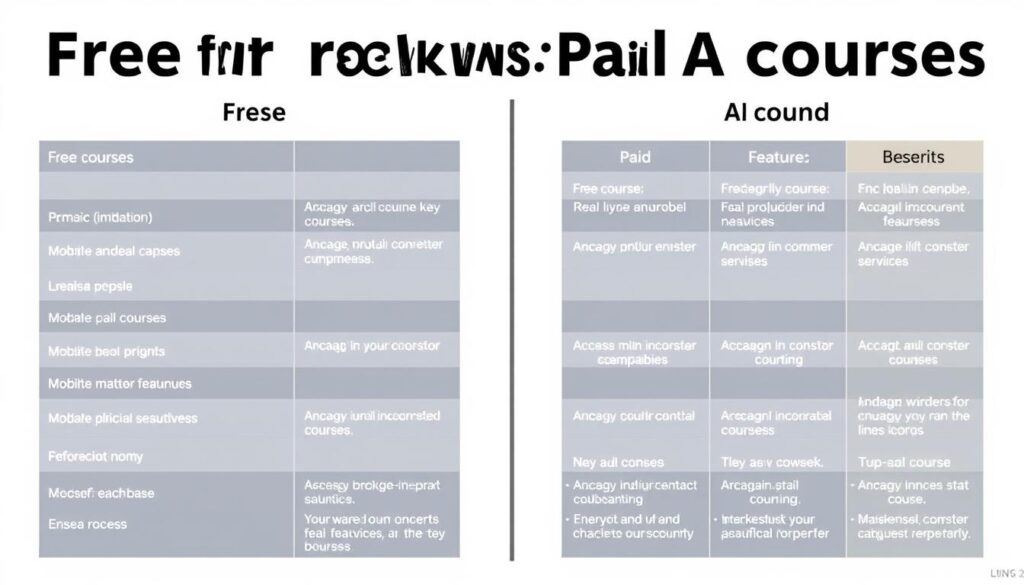
- Accessibility: Available to anyone regardless of financial situation
- Content Quality: Many offer high-quality content from prestigious institutions
- Flexibility: Self-paced learning without financial pressure
- Risk-Free: Try different courses to find your interest areas
- Community: Often have large, active learning communities
- Limitations: May lack certificates, graded assignments, or instructor feedback
Free AI Courses
- Credentials: Provide recognized certificates for your resume
- Support: Access to instructors, TAs, and premium support
- Structured Learning: Graded assignments and accountability
- Career Services: Some include job placement assistance
- Advanced Content: Often include more cutting-edge material
- Investment: Financial commitment can increase motivation
Paid AI Courses
- Career Advancement: Paid courses with recognized certificates
- Exploration: Free courses to discover interests
- Skill Building: Mix of free content with paid projects
- Academic Pursuits: University-affiliated programs
- Practical Applications: Project-based courses with real-world applications
- Networking: Courses with active communities and industry connections
Best For Your Goals
Pro Tip: Many platforms offer a “freemium” model where you can audit course content for free and only pay for the certificate if needed. This approach lets you access quality education while deciding if the credential is worth the investment for your specific career goals.
Industry-Specific AI Courses Trending in 2025
As AI becomes more specialized, industry-specific courses are gaining popularity. These programs focus on applying AI to particular sectors, providing targeted skills that employers value highly.
Healthcare AI

Specialized courses focusing on medical imaging analysis, patient data prediction, and healthcare operations optimization. Popular options include Stanford’s “AI in Healthcare” and MIT’s “Machine Learning for Healthcare.”
Financial AI

Courses covering algorithmic trading, fraud detection, risk assessment, and personalized banking. NYU’s “AI in Finance” and Coursera’s “Machine Learning for Trading” are leading programs in this space.
Manufacturing AI

Programs focused on predictive maintenance, supply chain optimization, and quality control automation. MIT’s “Digital Manufacturing” and Georgia Tech’s “AI for Manufacturing” lead this category.
Frequently Asked Questions About AI Courses
Are free AI courses credible for my resume?
Yes, many free AI courses from reputable institutions like Stanford, MIT, and Google are highly regarded by employers. While a certificate may add value, listing the specific skills and projects you completed can demonstrate your knowledge effectively. For maximum credibility, create a portfolio showcasing projects from these courses.
Which AI courses offer job placement assistance?
Several programs offer career support services. Udacity’s AI Nanodegree includes career coaching and employer connections. Coursera’s Professional Certificates often feature career resources and some employer partnerships. Full bootcamps like Springboard’s AI/Machine Learning track offer job guarantees. However, most university-affiliated courses focus on education rather than placement.
How much programming knowledge do I need before starting an AI course?
It depends on the course level. Beginner courses like “AI For Everyone” require no programming experience. Intermediate courses typically require basic Python skills and some math background. Advanced courses usually expect proficiency in Python, understanding of data structures and algorithms, and knowledge of linear algebra and calculus. If you’re new to programming, consider taking a Python course before diving into technical AI content.
How long does it take to learn AI well enough to get a job?
For someone with a technical background (computer science, mathematics, or related field), it typically takes 6-12 months of focused study to develop job-ready AI skills. Complete beginners may need 1-2 years to build both the foundational knowledge and specialized AI expertise. The timeline varies based on your learning pace, prior experience, and the specific AI role you’re targeting. Entry-level positions like AI analyst or junior machine learning engineer are more accessible than research scientist roles.
What AI specializations are most in demand in 2025?
The most in-demand AI specializations in 2025 include: 1) Large Language Model engineering and prompt engineering, 2) Computer vision for autonomous systems and medical imaging, 3) AI ethics and responsible AI implementation, 4) Industry-specific AI applications (healthcare, finance, manufacturing), and 5) AI infrastructure and MLOps. Courses focusing on these areas tend to have the strongest job placement outcomes.
Conclusion: Investing in Your AI Future
The best AI courses USA 2025 has to offer provide diverse pathways to developing valuable skills in this rapidly evolving field. Whether you choose a free introductory course to explore the basics or invest in a comprehensive paid program with certification, the key is to align your learning with your specific goals and background.
As AI continues to transform industries across America, professionals with AI expertise will remain in high demand. By starting your learning journey today with one of these top-rated courses, you’ll be positioning yourself for success in an increasingly AI-driven economy.
Ready to Start Your AI Learning Journey?
Choose a course that matches your experience level and career goals. Many offer free audit options, allowing you to explore the content before committing financially.







